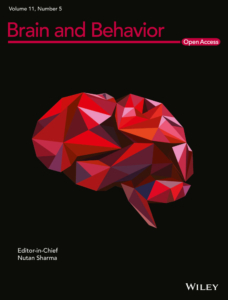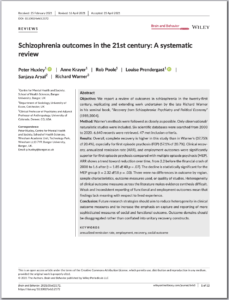Schizophrenia Outcomes Analysis Uses Dr. Warner’s Methods
British-based mental health specialists Peter Huxley, Anne Krayera, Rob Poolea, Louise Prendergast, and Sanjaya Aryal reported this month on a review of outcomes in schizophrenia in the 21st century, replicating and extending work undertaken by the late Colorado Recovery founder Richard Warner in his seminal book Recovery from Schizophrenia: Psychiatry and Political Economy (1985 and 2004).
The researchers followed Dr. Warner’s methods as closely as possible, including using only observational/naturalistic studies. Six scientific databases were searched from 2000 to 2020. 6,640 records were retrieved. Forty-seven met inclusion criteria.
In 1985, Dr. Warner used empirical evidence to strongly challenge the then prevailing view of schizophrenia, which suggested that psychosis was strongly characterised by poor clinical and social outcomes. Since then, evidence from epidemiological, sociological, psychological and biological studies have made many aspects of that outdated model unsustainable.
Warner distinguished between “complete recovery” and “social recovery”. He defined the former as loss of psychiatric symptoms and return to pre-illness level of functioning, whereas he defined social recovery in functional terms; economic and residential independence with low social disruption, an important component of which is employment.
Warner hypothesised that the social environment had a profound effect on the outcome of psychosis, so that circumstances that support people to social inclusion led to a virtuous cycle of improved well-being. This being the case, his thesis was that the political economy is a key modifiable factor in improving rates of recovery. In line with this, the researchers believe that employment status ought to receive more attention as an outcome indicator.
The researchers believe that “the most satisfactory definition of ‘complete recovery’ is clinical remission and sustained functional outcomes, which should include employment, for at least six months, but it is in the nature of a review of this sort that the relevant information is not always available in the public domain.”
In his own research, Warner showed that conditions such as social and political attitudes and the state of the economy, “mould the course and outcome of the illness and influence, along with other factors, its incidence” and by implication, outcome.
This new review of 21st century studies tends to confirm one of Warner’s key assertions, that a significant proportion of people who receive a schizophrenia diagnosis make a good recovery. Comparison of the new findings and Warner’s original findings show significant improvements in rates of first episode psychosis (FEP) recovery, with more disappointing results for multiple episodes psychosis (MEP,) especially post-2008.
Huxley et al. concluded there is growing recognition that “outcome” is most meaningfully understood in terms of social parameters. A new approach is needed that does not ignore the biological and psychological aspects of psychosis but does place both causation and intervention firmly in their social context. Psychosis is a disorder where onset, course and outcomes are profoundly affected by social factors. Recovery can only meaningfully be understood as a social phenomenon.
Colorado Recovery—created by Dr. Warner—approaches care for mental health based on a path of self-reliance through developed practiced skills. This non-institutionalized philosophy offers comprehensive levels of care supported by an expert medical and clinical team, engaging patients in increasing community participation.
Our treatment facility provides the services needed to address schizophrenia, bipolar disorder and other serious mental illnesses which are specific to each individual. Call us at 720-218-4068 to discuss treatment options for you or the person you would like to help.






